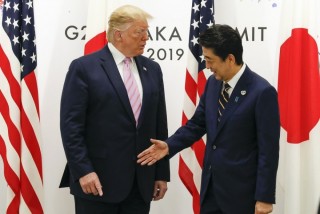Loading
Search
▼ Trump Makes Japan An Offer It Can’t Refuse
- Category:Other
The president is shaking down Tokyo and Seoul for billions more in security aid, and testing the foundations of U.S. alliances in Asia.
NATO has faced plenty of existential scares in the era of President Donald Trump, but now the United States’ long-standing allies in East Asia have become victims of the president’s haphazard transactional worldview. Last week, Trump announced that he would seek a fivefold increase in the nearly $1 billion a year South Korea contributes to maintain 28,500 U.S.
troops that have been stationed there since the dawn of the Cold War. Two days later, the administration announced it would demand that Japan pay $8 billion—four times its usual contribution—toward the cost of quartering 54,000 American service members in its territory. Two of the most enduring, and sensitive, American alliances of the past half-century have now devolved into haggling over “cost sharing,” New York–mob-protection-style.
For Japan, whose prime minister has spent considerable energy and personal dignity courting Trump, the shakedown coincides with several other key alliance discussions, including on the very sensitive topic of whether American missiles are likely to come to Japanese soil anytime soon. But to understand that fraught issue—and how the White House is making it more fraught—you have to look to another recently sunken U.S. strategic agreement.
Earlier this year, the U.S withdrew from the 1987 Intermediate-Range Nuclear Forces Treaty, citing Russian violations of the agreement, which banned all ground-launched cruise and ballistic missiles—nuclear and nonnuclear—with ranges between 500 and 5,500 kilometers.
In Tokyo, where I just spent a week researching Japanese attitudes toward Japan’s strategic future, the administration’s decision was largely seen as justified—even if its implications in Asia and Europe remain far from clear.
As I wrote on the INF’s demise in August, the White House’s decision to jettison the agreement could spur a new arms race in Asia, one that the U.S. and its allies might find difficult to dominate. Japan’s biggest post-INF concern in the region is China. As the Pentagon told Congress in its most recent annual briefing on Chinese capabilities, Beijing has a well-diversified arsenal of thousands of cruise and ballistic missiles—many of them nuclear-capable—pointed at Taiwan and at U.S. installations in East Asia, including in Japan. New capabilities, like China’s DF-17 hypersonic glider-equipped missile, seen paraded on October 1, also concern Japan.
Were this arsenal to proliferate further, the U.S. might seek to deter attacks on its allies by placing shorter-range missiles of its own in the region. In short: Even as Trump demands greater tribute from Tokyo, his treaty-busting strategy may soon compel him to want Japan to host more and newer U.S. missile deployments.
To get around some of these political headaches in peacetime, some Japanese officials are drawn to the possibility of accepting rotational American missile deployments as geopolitical developments dictate. The thinking here goes that once the going gets tough, the Americans get going and, in a real crisis, the Japanese public will be more tolerant of highly sensitive weapons in their midst.
But that could be a recipe for escalation. This was a perspective I heard quite a bit in Tokyo: Japanese policymakers, mindful of China’s threat perceptions, imagine scenarios in which suddenly flying in U.S. missile reinforcements from Guam, Alaska, or Hawaii could make a bad situation worse. Say, for instance, that political indicators are high for a Chinese invasion of Taiwan: Japan might be tempted to call for the American missile cavalry as a deterrent. Chinese missile forces would then have incentives to accelerate their military plans before U.S. missiles could be loaded onto transports and flown into Japan. In the international security jargon, this would adversely affect crisis stability.
So what is to be done? Japanese policymakers are still figuring that out. Washington has yet to open formal consultations with the Japanese government on a new missile posture. But none of the debate on American weaponry in Japan will end up mattering much if there isn’t a functional U.S.-Japan relationship to begin with.
Trump’s broader posture as a shakedown artist has deeply glitched out America’s decades-long, delicate partnerships in Asia. Indeed, privately, many Japanese strategic elites worry about what happens if Trump is reelected—a prospect that is now widely seen as a grave challenge to the alliance, the cornerstone of Japanese security. War is a racket, it’s been said, but under Trump, peace is, too, and the costs of being an American ally may soon swamp the benefits.
- November 19, 2019
- Comment (0)
- Trackback(0)


